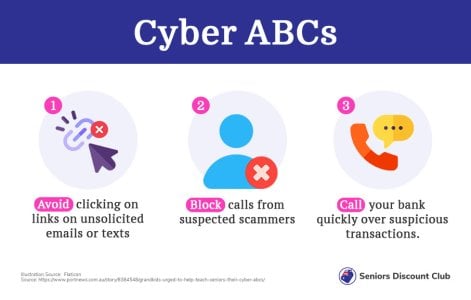Don’t be the next scam victim: Learn your cyber ABCs now!
At the SDC, we mostly appreciate the ease technology offers in our daily lives.
However, it's important to note that seniors, despite enjoying its advantages, face a higher risk of cybercrimes and must take measures for their online safety.
In line with this, the Australian Federal Police (AFP) has shared cybersecurity tips, urging the younger generation to help their ‘less tech-savvy’ grandparents learn their ‘ABCs’ to shield themselves against online scams.
As part of Cyber Awareness Month, the AFP aims to educate all Australians, particularly seniors, about their ‘ABCs’.
This involves avoiding links in unsolicited messages, blocking suspicious callers, and calling the bank promptly about questionable transactions.
The AFP believes that grandchildren are well-suited to relay this information to the older generation, given they are more familiar with technology.
‘We are asking Australians to have conversations with grandparents or parents about simple things they can do to protect themselves,’ AFP Acting Assistant Commissioner Cyber Command Paula Hudson said.
‘Grandchildren—whether they are 20 or 40 years old—can be one of the greatest lines of defence for older generations when it comes to the online world.

‘One example could be showing seniors how to block a scam call on an iPhone.’
The AFP will collaborate with National Seniors Australia to release 90-second online videos guiding viewers on outsmarting potential scammers.
‘It would be great if grandkids could watch the videos with their nan and pop, nonno or nonna, or baba or deda,’ Ms Hudson said.
‘It also gives an opportunity for younger generations to brush up on their knowledge.’
Ms Hudson hoped the tips and videos would boost the confidence and knowledge of people across age groups, as some older cybercrime victims felt ashamed, self-blamed, and kept their experiences private.
Unfortunately, seniors are highly targeted by online fraudsters due to a perceived lack of internet savvy. Understanding the common types of scams is a crucial part of cyber ABCs.
One of the most widespread scams is remote access scams or tech support scams. Within this ploy, seniors receive a call or a message from someone claiming to be tech support who informs them their computer has a problem. They ask for remote access to the senior's computer to 'fix' the issue. Once they have that access, they can steal sensitive information.
Another common scheme is the infamous ‘hi mum’ scam. In this approach, a swindler contacts a parent pretending to be their child in a serious predicament, usually requiring immediate financial assistance. The scammers create a sense of urgency and emotional distress to pressure the grandparent into wiring money or providing bank account details.
The AFP has successfully recovered $45 million that cybercriminals had stolen from Australian businesses in the past three years. Video source: Facebook (@AusFedPolice)
Phishing emails, another prevalent scam, pose as communications from trustworthy organizations like banks or government agencies like myGov. They often contain a link leading to a fake website where seniors are tricked into giving away their personal information. It's essential to remind seniors that reputable organisations will never ask for sensitive information via email.
Lastly, we have romance scams. This involves fraudsters forming romantic connections with seniors online, only to exploit their new 'partners' financially. It's often a longer con, with scammers taking the time to build trust with their targets before asking for money, often under a fabricated emergency.
It's important to reiterate these scams' hallmarks: unsolicited contacts, requests for sensitive information, or pressured appeals for emergency aid.
Always double-check any message and never share personal information with unverified sources. When it comes to scams, staying sceptical and vigilant is never wrong.
Remember, when it comes to online safety, an ounce of prevention is worth a pound (around two kilos, mates) of cure.

Members, who assisted you in understanding your cyber security 'ABCs'? Did your grandkids help, or did you handle it on your own? Share your experiences in the comments below!
However, it's important to note that seniors, despite enjoying its advantages, face a higher risk of cybercrimes and must take measures for their online safety.
In line with this, the Australian Federal Police (AFP) has shared cybersecurity tips, urging the younger generation to help their ‘less tech-savvy’ grandparents learn their ‘ABCs’ to shield themselves against online scams.
As part of Cyber Awareness Month, the AFP aims to educate all Australians, particularly seniors, about their ‘ABCs’.
This involves avoiding links in unsolicited messages, blocking suspicious callers, and calling the bank promptly about questionable transactions.
The AFP believes that grandchildren are well-suited to relay this information to the older generation, given they are more familiar with technology.
‘We are asking Australians to have conversations with grandparents or parents about simple things they can do to protect themselves,’ AFP Acting Assistant Commissioner Cyber Command Paula Hudson said.
‘Grandchildren—whether they are 20 or 40 years old—can be one of the greatest lines of defence for older generations when it comes to the online world.

The AFP has released a video series on cybercrimes, including different types and how to avoid them.
‘One example could be showing seniors how to block a scam call on an iPhone.’
The AFP will collaborate with National Seniors Australia to release 90-second online videos guiding viewers on outsmarting potential scammers.
‘It would be great if grandkids could watch the videos with their nan and pop, nonno or nonna, or baba or deda,’ Ms Hudson said.
‘It also gives an opportunity for younger generations to brush up on their knowledge.’
Ms Hudson hoped the tips and videos would boost the confidence and knowledge of people across age groups, as some older cybercrime victims felt ashamed, self-blamed, and kept their experiences private.
Unfortunately, seniors are highly targeted by online fraudsters due to a perceived lack of internet savvy. Understanding the common types of scams is a crucial part of cyber ABCs.
One of the most widespread scams is remote access scams or tech support scams. Within this ploy, seniors receive a call or a message from someone claiming to be tech support who informs them their computer has a problem. They ask for remote access to the senior's computer to 'fix' the issue. Once they have that access, they can steal sensitive information.
Another common scheme is the infamous ‘hi mum’ scam. In this approach, a swindler contacts a parent pretending to be their child in a serious predicament, usually requiring immediate financial assistance. The scammers create a sense of urgency and emotional distress to pressure the grandparent into wiring money or providing bank account details.
The AFP has successfully recovered $45 million that cybercriminals had stolen from Australian businesses in the past three years. Video source: Facebook (@AusFedPolice)
Phishing emails, another prevalent scam, pose as communications from trustworthy organizations like banks or government agencies like myGov. They often contain a link leading to a fake website where seniors are tricked into giving away their personal information. It's essential to remind seniors that reputable organisations will never ask for sensitive information via email.
Lastly, we have romance scams. This involves fraudsters forming romantic connections with seniors online, only to exploit their new 'partners' financially. It's often a longer con, with scammers taking the time to build trust with their targets before asking for money, often under a fabricated emergency.
It's important to reiterate these scams' hallmarks: unsolicited contacts, requests for sensitive information, or pressured appeals for emergency aid.
Always double-check any message and never share personal information with unverified sources. When it comes to scams, staying sceptical and vigilant is never wrong.
Remember, when it comes to online safety, an ounce of prevention is worth a pound (around two kilos, mates) of cure.
Key Takeaways
- The Australian Federal Police (AFP) encourages grandchildren to teach their grandparents about online scam prevention.
- Grandchildren are seen as a key defence for seniors online.
- AFP collaborates with National Seniors Australia on 90-second videos about online scam awareness.
- The initiative focuses on empowering seniors, especially those previously victimised by cybercrime.
- Always verify unsolicited messages and don't share personal details with unverified sources to avoid online scams.
Last edited:








